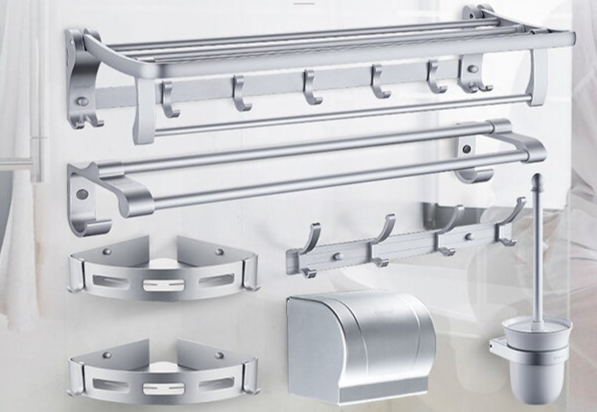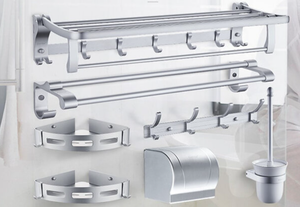
How to conduct the inspection process for hardware accessories? Inspection, factory verification, and certification services.
As an important component of the bathroom space, the quality of hardware fixtures directly affects the usage experience and durability. To ensure that the products meet industry standards and quality certification requirements, establishing a professional inspection process is of utmost importance. This article will systematically introduce the inspection standards, testing methods, and certification requirements for bathroom hardware fixtures, providing a complete quality control guide for enterprises.
I. Material Certification Standards System
Material Classification Certification
Stainless Steel Material Certification
Advantages: Resistant to wear and corrosion, and not prone to rusting.
Disadvantages: Limited design variety and restricted production techniques
Certification points: Material composition testing, rust prevention performance verification
Copper-plated chrome material certification
Hollow copper chrome plating:
Advantages: Various styles, reasonable prices
Disadvantages: The electroplated layer is prone to wear and tear, and the strength of the pipe wall needs to be verified.
Certification method: Stress test, electroplating thickness measurement
All-copper solid chrome plating:
Advantages: Fine craftsmanship, thick electroplating layer, high durability
Disadvantages: High price, limited style options
Certification points: Solid verification, electroplating quality inspection
Aluminum alloy material certification
Advantages: Lightweight, durable and highly wear-resistant.
Disadvantage: May oxidize and change color over time.
Certification Focus: Oxidation Resistance Performance Test
II. Process Inspection Certification Standards
1. First Article Inspection Certification
Inspection Timing: At the beginning of each process/When producing the first batch of new products
Certification Requirements:
Conduct a comprehensive inspection of the comparison verification samples
Carry out according to the customer's technical requirements.
Non-conforming products must have their processes adjusted until they meet the standards.
Record the inspection results on the "First Article Inspection Record Form"
2. Process Inspection Certification
Sampling standard: The sampling frequency is determined according to the QC engineering table.
Inspection records: Completely recorded in the "Quality Inspection Records"
Exception handling: Stop the machine immediately upon detection of non-conformity for adjustment.
3. Non-conforming Product Control Certification
Products with one or more defects are classified as non-conforming.
Establish clear criteria for defect determination
Non-conforming products should be clearly marked and isolated for handling.
Carry out full-process monitoring in accordance with the IPQC inspection procedure
III. Certification Standards for Inspection Guidelines
3.1 Inspection of Raw Materials Certification
Surface Quality: No dents, deformations, smooth weld seams
Dimension accuracy: Measured using tools such as calipers and thickness gauges.
Material identification: Verified through features such as appearance and impact sound.
3.2 Electroplating Process Quality Certification
Surface requirements: No scratches, color differences, spots, peeling, or other defects.
Adhesion test: Use an appropriate force to impact to verify the firmness of the coating.
Acceptance criteria: Compare against the confirmed sample.
3.3 Dimension Accuracy Certification
Testing tools: Calipers, Micrometers, Thickness Gauges, etc. (precise measuring instruments)
Tolerance control: Strictly controlled within the requirements specified in the customer's drawings.
Measurement method: Follow the standard measurement procedures.
3.4 Corrosion Resistance Certification
Salt Spray Test Standard:
Salinity concentration: Mass fraction 5% (Salt: Water = 5:95)
Test environment: Water quality and pH value are strictly controlled.
Observation frequency: Record the test status every two hours.
Acceptance criteria:
Set corresponding standards according to different surface treatment processes
The final acceptance shall be based on meeting the specific requirements of the customers.
IV. Inspection and Certification Process Standards
1. Sampling Inspection Plan
Implement statistical sampling in accordance with the AQL standard
Key performance items will undergo stricter inspections.
Establish a complete quality traceability system
2. Test environment requirements
Standardized laboratory environment
Use calibrated and qualified testing equipment
Strictly follow the test operation procedures
3. Defect Level Determination
Serious Defect: Any item that affects the safety of use will not be tolerated.
Main defect: Quality issue that lowers the product grade
Minor defect: Minor appearance flaws are within the acceptable range as per the standards.
V. Key Control Matters for Factory Inspection Certification
To ensure that the quality of bathroom hardware accessories continues to meet the certification requirements, during the factory inspection process, the following matters need to be given special attention:
Raw material control: Establish a supplier material certification system
Production process control: Establish operation standards for key processes such as electroplating and polishing.
Calibration of testing equipment: Regularly calibrate all measuring instruments
Environmental Management: Environmental Control Requirements for Electroplating Workshop
Personnel qualification certification: Professional training and qualification certification for inspection personnel
Inspection and Certification Summary
The inspection and factory verification of bathroom hardware accessories is a systematic project that requires comprehensive testing and certification from raw materials, production processes to final product quality. By establishing a professional inspection process and strict quality standards, enterprises can ensure that their products meet industry certification requirements, providing consumers with durable, aesthetically pleasing, and functionally complete products.
分享这个商品

How to conduct the inspection process for hardware accessories? Inspec
As an important component of the bathroom space, the quality of the hardware fixtures directly affects the usage experience and durability.
